Related Research Articles

Boney M. are a eurodisco group that specialises in R&B, reggae, disco and funk, created by German record producer Frank Farian, who was the group's primary songwriter. Originally based in West Germany, the four original members of the group's official line-up were Liz Mitchell and Marcia Barrett from Jamaica, Maizie Williams from Montserrat, and Bobby Farrell from Aruba. The group was formed in 1976 and achieved popularity during the disco era of the late 1970s. Since the 1980s, various line-ups of the band have performed with differing personnel.
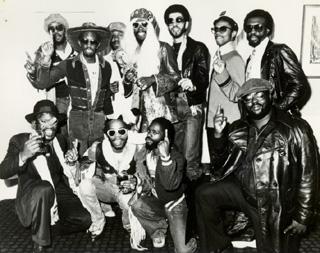
Parliament was an American funk band formed in the late 1960s by George Clinton as a flagship act of his P-Funk collective. Evolving out of an earlier vocal group, Parliament became associated with a more commercial and less rock-oriented sound than its sister act Funkadelic. Their work incorporated Afrofuturism concepts, horn arrangements, synthesizer, and outlandish theatrics. The band scored a number of Top 10 hits, including the million-selling 1976 single "Give Up the Funk ," and Top 40 albums such as Mothership Connection (1975).
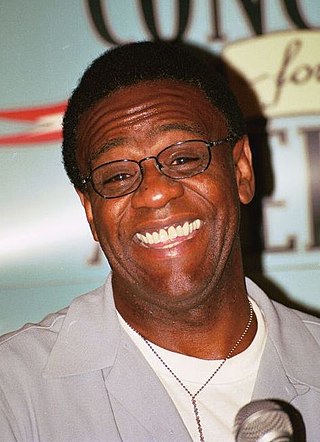
Albert Leornes Greene, known professionally as Al Green, is an American singer, songwriter, pastor and record producer best known for recording a series of soul hit singles in the early 1970s, including "Take Me to the River", "Tired of Being Alone", "I'm Still in Love with You", "Love and Happiness", and his signature song, "Let's Stay Together". After his girlfriend died by suicide, Green became an ordained pastor and turned to gospel music. He later returned to secular music.
Peter Brown is an American singer-songwriter and record producer. Brown was a popular performer in the late 1970s and early 1980s. His biggest success was the release of the LP in 1977 called A Fantasy Love Affair which produced the disco hits "Do Ya Wanna Get Funky with Me" and "Dance With Me". He wrote, with Robert Rans, Madonna's hit "Material Girl".
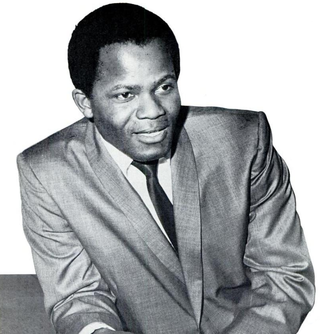
Yusuf Hazziez, known professionally as Joe Tex, was an American singer and musician who gained success in the 1960s and 1970s with his brand of Southern soul, which mixed the styles of funk, country, gospel, and rhythm and blues.
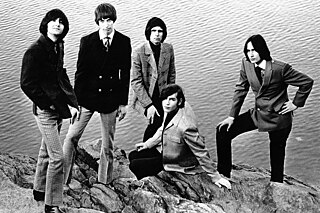
The Left Banke was an American baroque pop band, formed in New York City in 1965. They are best remembered for their two U.S. hit singles, "Walk Away Renée" and "Pretty Ballerina". The band often used what the music press referred to as "baroque" string arrangements, which led to their music being variously termed as "Bach-rock", "baroque rock" or "baroque pop". The band's vocal harmonies borrowed from contemporaries such as the Beatles, the Zombies and other British Invasion groups.
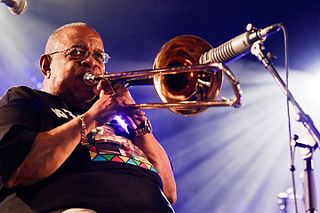
The J.B.'s was James Brown's band from 1970 through the early 1980s. On records the band was sometimes billed under alternate names such as Fred Wesley and the JBs, The James Brown Soul Train, Maceo and the Macks, A.A.B.B., Fred Wesley and the New JBs, The First Family, and The Last Word. In addition to backing Brown, the J.B.'s played behind Bobby Byrd, Lyn Collins, and other singers associated with the James Brown Revue, and performed and recorded as a self-contained group. In 2015, they were nominated for induction into the Rock and Roll Hall of Fame but failed to be inducted and can be considered for Musical Excellence in the future. They have been eligible since 1995.
"Rivers of Babylon" is a Rastafari song written and recorded by Brent Dowe and Trevor McNaughton of the Jamaican reggae group The Melodians in 1970. The lyrics are adapted from the texts of Psalms 19 and 137 in the Hebrew Bible. The Melodians' original version of the song appeared on the soundtrack album for the 1972 movie The Harder They Come, which made it internationally known.

Dennis Emmanuel Brown CD was a Jamaican reggae singer. During his prolific career, which began in the late 1960s when he was aged eleven, he recorded more than 75 albums and was one of the major stars of lovers rock, a subgenre of reggae. Bob Marley cited Brown as his favourite singer, dubbing him "The Crown Prince of Reggae", and Brown would prove influential on future generations of reggae singers.

Roy James Brown was an American blues singer who had a significant influence on the early development of rock and roll and the direction of R&B. His original song and hit recording "Good Rockin' Tonight" has been covered by many artists including Wynonie Harris, Elvis Presley, Bruce Springsteen, Paul McCartney, Joe Ely, Ricky Nelson, Jerry Lee Lewis, Pat Boone, James Brown, the Doors, and the rock group Montrose. Brown was one of the first popular R&B singers to perform songs with a gospel-steeped delivery, which was then considered taboo by many churches. In addition, his melismatic, pleading vocal style influenced notable artists such as B.B. King, Bobby Bland, Elvis Presley, Jackie Wilson, James Brown and Little Richard.

"Good Rocking Tonight" is a jump blues song originally released in 1947 by its writer, Roy Brown and was covered by many recording artists. The song includes the memorable refrain, "Well I heard the news, there's good rocking tonight!" The song anticipated elements of rock and roll music.

The Unissued Johnny Cash is a compilation album and 59th overall album by American country singer Johnny Cash, released on Bear Family Records in 1978. It is tailored to completist fans of Cash as it consists entirely of rare or unreleased material from Cash's early Columbia days. The first four tracks, all recorded in August, 1958, are outtakes from The Fabulous Johnny Cash, and also appear on the CD re-release of that album. Likewise, the outtake "The Fable of Willie Brown" appears on the re-release of Ride This Train. The Carter Family song "I'll Be All Smiles Tonight" is an outtake from Blood Sweat and Tears.

"Don't It Make My Brown Eyes Blue" is a song written by Richard Leigh, and recorded by American country music singer Crystal Gayle. It was released in June 1977 as the first single from Gayle's album We Must Believe in Magic.

"You Light Up My Life" is a ballad written by Joseph Brooks, and originally recorded by Kasey Cisyk for the soundtrack album to the 1977 film of the same title. The song was lip synced in the film by its lead actress, Didi Conn. The best-known cover version of the song is a cover by Debby Boone, the daughter of singer Pat Boone. It held the No. 1 position on the Billboard Hot 100 chart for ten consecutive weeks in 1977 and topped Record World magazine's Top 100 Singles Chart for a record 13 weeks.

"Mother Popcorn (You Got to Have a Mother for Me)" is a song recorded by James Brown and released as a two-part single in 1969. A #1 R&B and #11 Pop hit, it was the highest-charting of a series of recordings inspired by the popular dance the Popcorn which Brown made that year, including "The Popcorn", "Lowdown Popcorn", and "Let a Man Come In and Do the Popcorn". The "mother" of the song's title was, in the words of biographer RJ Smith, "[Brown's] honorific for a big butt".

"Brown Girl in the Ring" is a traditional children's song in the islands of the West Indies. Originally said to have originated in Jamaica, as part of the children's game also known as "Brown Girl in the Ring". The songs lyrics instruct the game's performance: as a girl enters the ring, formed by children holding hands, and performs a dance.
"I Can't Stand Myself (When You Touch Me)", also known as "I Can't Stand It", is a song written and recorded by James Brown in 1967. It is the most successful of the handful of recordings he made with The Dapps, a band of white musicians led by Beau Dollar. The single release of the song, on which its transposure was pushed up a half step/key, rose to #4 on the Billboard R&B chart and #28 on the Pop chart. The single's B-side, "There Was a Time", also charted.
"Eyesight" is a song written and performed by James Brown. Released as a single in 1978, it charted #38 R&B. It also appeared on Brown's 1978 album Jam/1980's.
"For Goodness Sakes, Look at Those Cakes" is a song written and performed by James Brown. Released as an edited two-part single in 1978, it charted #52 R&B in 1979. A full-length version appears on the album Take a Look at Those Cakes. Brown talks loudly and clearly in rhyme with only brief singing involved, this track being in part a precursor to the hip hop style which was yet to mount on record in a few years time. Robert Christgau described the song as "a great throwaway--an eleven-minute rumination on ass-watching, including genuinely tasteless suggestions that Ray Charles and Stevie Wonder join the fun."

The Best Days of My Life is an album by American pop singer Johnny Mathis, released on January 29, 1979, by Columbia Records. He scaled back considerably on his more than decade-long practice of recording recent hit songs by other artists. He did, however, cover two standards: "As Time Goes By" and "Begin the Beguine", the latter of which is given a disco arrangement.
References
- ↑ White, Cliff (1991). "Discography". In Star Time (pp. 54–59) [CD booklet]. New York: PolyGram Records.